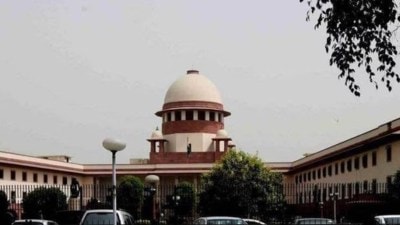Ritu Sarin is Executive Editor (News and Investigations) at The Indian Express group. Her areas of specialisation include internal security, money laundering and corruption. Sarin is one of India’s most renowned reporters and has a career in journalism of over four decades. She is a member of the International Consortium of Investigative Journalists (ICIJ) since 1999 and since early 2023, a member of its Board of Directors. She has also been a founder member of the ICIJ Network Committee (INC). She has, to begin with, alone, and later led teams which have worked on ICIJ’s Offshore Leaks, Swiss Leaks, the Pulitzer Prize winning Panama Papers, Paradise Papers, Implant Files, Fincen Files, Pandora Papers, the Uber Files and Deforestation Inc. She has conducted investigative journalism workshops and addressed investigative journalism conferences with a specialisation on collaborative journalism in several countries. ... Read More
A house for the Don beyond Govt’s grasp
On Sunday, the Finance Minister and the Law Minister will sit in Vigyan Bhavan during the first-ever conference on tackling terrorism and cr...

On Sunday, the Finance Minister and the Law Minister will sit in Vigyan Bhavan during the first-ever conference on tackling terrorism and crime through ‘‘forfeiture of property.’’ It’s unlikely that the seminar speakers will admit to New Delhi’s dismal record on the subject.
Or acknowledge the fact that although it’s been nine years since they drew up a list of 242 properties allegedly owned by D-company gangsters, only 71 are under forfeiture—and most of these face challenge in courts.
Contrast this with forfeiture figures from the US. In 2000 alone, the Justice Dept forfeited 59,656 assets.
In the case of Dawood Ibrahim—against whom there is a list of 30 properties—it was his mother Amina Bi who challenged the forfeiture orders. And one appeal is being heard though she died two years ago.
Another case that’s going on right now in the court of the Appellate Tribunal for Forfeited Property in Lok Nayak Bhavan involves Mumbai druglord Iqbal Mirchi. He is on the run but his lawyers are trying to stave off forfeiture. Mirchi’s brother, Aslam, claims the properties were purchased with ‘‘reward money’’ he got when he was with Customs!
This plea is typical, says M Krishnamurthy, the law administrator handling forfeiture cases in Mumbai. Other ‘‘excuses,’’ have been: money came as prizes in crossword, quiz competitions. ‘‘The gangsters’ families fight tooth and nail. Proving these properties were bought by the gangster is difficult and causes delay.’’
Forfeiture orders are passed under the Smugglers and Forex Manipulators Act 1976 and the Narcotics Drugs and Psychotropics Seizure (NDPS) Act. Whether POTA fast-tracks the process is a question that may come up at Sunday’s seminar.
Photos





- 01
- 02
- 03
- 04
- 05



























